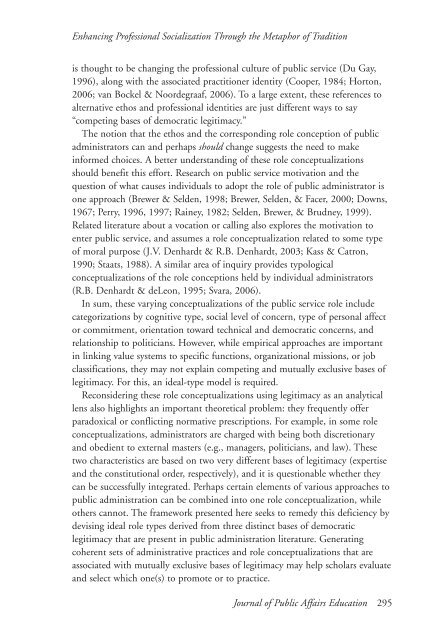JOURNAL OF PUBLIC AFFAIRS EDUCATION - naspaa
JOURNAL OF PUBLIC AFFAIRS EDUCATION - naspaa
JOURNAL OF PUBLIC AFFAIRS EDUCATION - naspaa
Create successful ePaper yourself
Turn your PDF publications into a flip-book with our unique Google optimized e-Paper software.
Enhancing Professional Socialization Through the Metaphor of Tradition<br />
is thought to be changing the professional culture of public service (Du Gay,<br />
1996), along with the associated practitioner identity (Cooper, 1984; Horton,<br />
2006; van Bockel & Noordegraaf, 2006). To a large extent, these references to<br />
alternative ethos and professional identities are just different ways to say<br />
“competing bases of democratic legitimacy.”<br />
The notion that the ethos and the corresponding role conception of public<br />
administrators can and perhaps should change suggests the need to make<br />
informed choices. A better understanding of these role conceptualizations<br />
should benefit this effort. Research on public service motivation and the<br />
question of what causes individuals to adopt the role of public administrator is<br />
one approach (Brewer & Selden, 1998; Brewer, Selden, & Facer, 2000; Downs,<br />
1967; Perry, 1996, 1997; Rainey, 1982; Selden, Brewer, & Brudney, 1999).<br />
Related literature about a vocation or calling also explores the motivation to<br />
enter public service, and assumes a role conceptualization related to some type<br />
of moral purpose (J.V. Denhardt & R.B. Denhardt, 2003; Kass & Catron,<br />
1990; Staats, 1988). A similar area of inquiry provides typological<br />
conceptualizations of the role conceptions held by individual administrators<br />
(R.B. Denhardt & deLeon, 1995; Svara, 2006).<br />
In sum, these varying conceptualizations of the public service role include<br />
categorizations by cognitive type, social level of concern, type of personal affect<br />
or commitment, orientation toward technical and democratic concerns, and<br />
relationship to politicians. However, while empirical approaches are important<br />
in linking value systems to specific functions, organizational missions, or job<br />
classifications, they may not explain competing and mutually exclusive bases of<br />
legitimacy. For this, an ideal-type model is required.<br />
Reconsidering these role conceptualizations using legitimacy as an analytical<br />
lens also highlights an important theoretical problem: they frequently offer<br />
paradoxical or conflicting normative prescriptions. For example, in some role<br />
conceptualizations, administrators are charged with being both discretionary<br />
and obedient to external masters (e.g., managers, politicians, and law). These<br />
two characteristics are based on two very different bases of legitimacy (expertise<br />
and the constitutional order, respectively), and it is questionable whether they<br />
can be successfully integrated. Perhaps certain elements of various approaches to<br />
public administration can be combined into one role conceptualization, while<br />
others cannot. The framework presented here seeks to remedy this deficiency by<br />
devising ideal role types derived from three distinct bases of democratic<br />
legitimacy that are present in public administration literature. Generating<br />
coherent sets of administrative practices and role conceptualizations that are<br />
associated with mutually exclusive bases of legitimacy may help scholars evaluate<br />
and select which one(s) to promote or to practice.<br />
Journal of Public Affairs Education 295
















